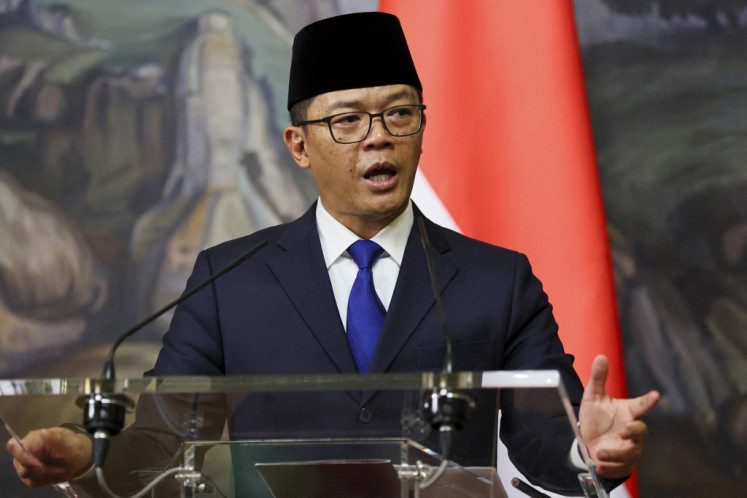Popular Reads
Top Results
Can't find what you're looking for?
View all search resultsPopular Reads
Top Results
Can't find what you're looking for?
View all search resultsRI proposes renewable energy forum
The Indonesian Renewable Energy Society (IRES) invited similar organizations from other members of the Asia Pacific Economic Cooperation (APEC) to establish a renewable energy forum within the 21-member economies as part of its plan to support the organizationâs agreement to set up a renewable energy development initiative
Change text size
Gift Premium Articles
to Anyone

T
he Indonesian Renewable Energy Society (IRES) invited similar organizations from other members of the Asia Pacific Economic Cooperation (APEC) to establish a renewable energy forum within the 21-member economies as part of its plan to support the organization's agreement to set up a renewable energy development initiative.
Rachmat Gobel, IRES chairman said in Nusa Dua, Bali, on Wednesday, that the forum, which would consist of energy related companies, users and consultants, would become the government's partner in promoting the use of renewable energy in member countries.
The governments would have a reliable partner to explore ways in promoting the use of renewable energy and seek solutions in coping with technology and financing problems, Rachmat said after the closing of a three day conference on clean, renewable and sustainable energy.
APEC officials agreed to establish a renewable energy development initiative in the meeting, which was organized by the IRES as part of the APEC Leaders meetings.
Energy and Mineral Resources Ministry's director general of new and renewable energy, Rida Mulyana, said the agreement would pave the way to establish a new cooperation framework under APEC, which would deal with the task of coordinating exchange of information, technology and smoothen flows of investments on renewable energy within the 21-member economies.
Indonesia will have no choice but to develop new and renewable energy to meet the sharp growth in the country's energy demand. Indonesia, a former member of the Organization of Petroleum Exporting Countries (OPEC), has now become a net oil importer due to continued decline in its oil production. The government had issued a number of regulations to spur the production of non-fossil-based energy such as geothermal, hydro and solar.
Legal uncertainties however, still hamper the development of energy alternatives.
Herman Darnel Ibrahim, a board member of the National Energy Council, said he strongly welcomed the establishment of the renewable energy development initiative proposed by APEC. However, the government should also be rationale because the development of renewable energy would be quite costly.
'Instead of pursuing 'clean' we should focus on 'cleaner', meaning applying the latest technology to the existing power plants, so they are friendlier toward the environment,' said Herman.
'Don't get me wrong, I'm not against renewable energy. However, we must be realistic and pursue a cheaper energy source first [..] to avoid burdening the state budget,' he added
The country's energy mix in 2050, according to National Energy Policy Design, should comprise 30 percent renewable energy, 26 percent coal, 24 percent gas and 20 percent oil. In order to meet the target, in 2025 renewable energy use should account for at least 23 percent of total energy consumption. Also in the same year, oil should account for 25 percent, coal 30 percent and gas 22 percent.
Currently, the council's data shows that Indonesia still relies on oil to meet 44 percent of its energy needs, while gas accounts for 23 percent, coal 27 percent and renewable energy 6 percent.









